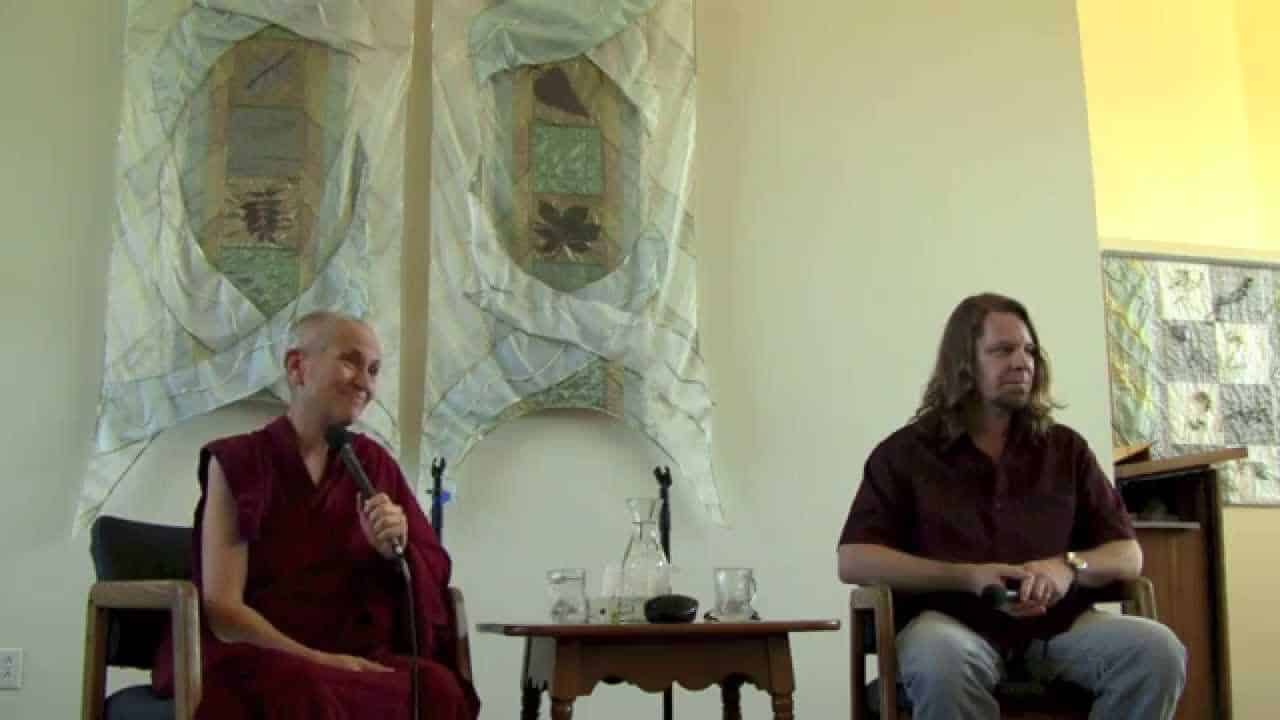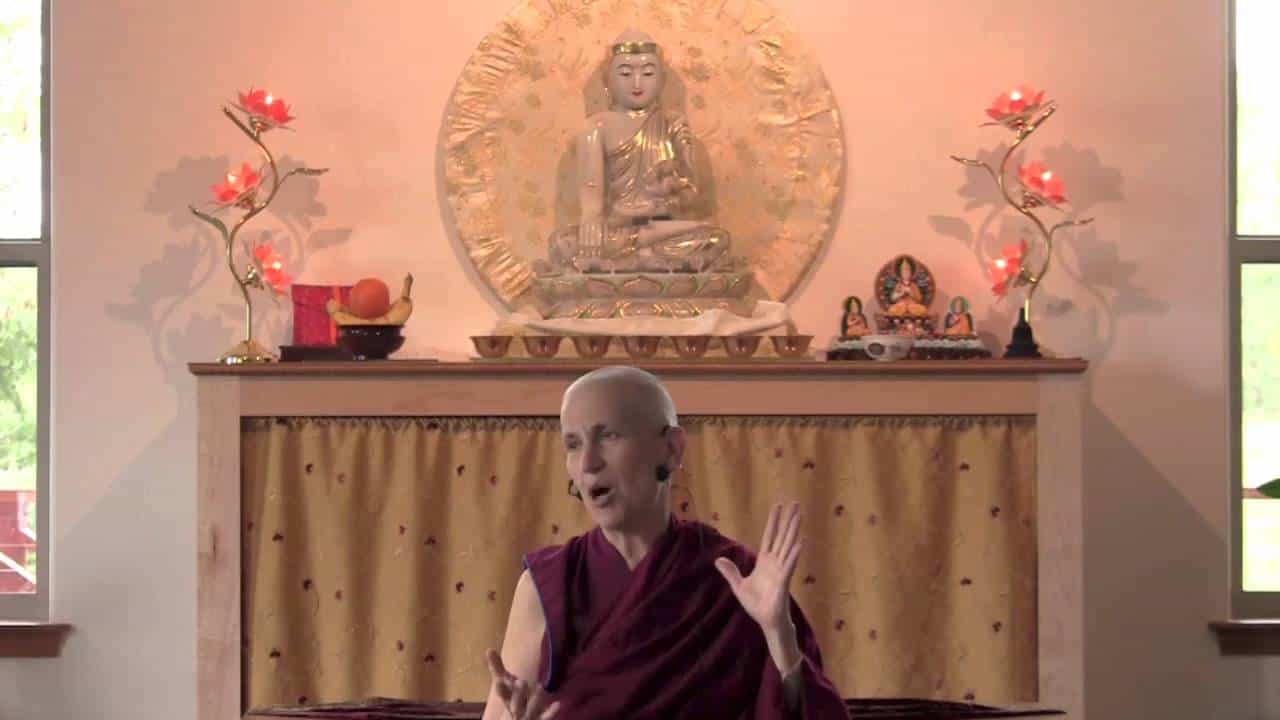The power of optimism
- Frogs and ground squirrels: two stories
- The benefit of looking at a situation with a happy mind
- Rejoicing in what is good in the world
- Suggestions for mind training practice
The power of optimism (download)
I wanted to talk about our outing yesterday when we went to see our friends at their land nearby. And in addition to their total love of nature and living beings, what really remained with me from the afternoon was their optimistic take on life.
At one point Jim was telling us the story about being on the 16th hole of a golf course and hearing a frog croaking. (Or was it a toad? Anyway…. I think it was a frog, croaking.) They traced it. One of its legs was stuck in a sprinkler and Jim tried to get it out, he couldn’t get it out, the frog was going to die if it stayed there. So they cut off the frog’s leg—because it was the only way to keep it alive—took it home, nurtured it. They had this little pond that they had created, put this frog in the pond, and he healed. And he lived four months in this pond until one September we had a sudden freeze and then he was just frozen there and died.
Jim told the story and my heart went, “Oh, this poor frog, he died like that, frozen in the water.” And Jim was going, “It was so wonderful that he came and he lived four months with us.” And I was thinking, “Now wow, what an instance of the glass half full and the glass half empty.” And whenever Jim talked about any of the living beings on their land it was with so much love and he totally accepted their impermanence, that they weren’t going to be there forever. That they were temporary creatures and however long they were there he was delighted.
And I thought, now that’s really the Dharma perspective, isn’t it? That’s totally how His Holiness looks at life. Whereas so many of us get bogged down in “what could have been but wasn’t,” or, “what should have been, but isn’t.” Where they’re just looking at what was and being happy about it. “Wow, the frog didn’t die on the golf course, it lived four more months with us, in a happy way, in this pool.” And both of them just rejoiced at that.
So I thought, you know, this is really an important thing for us to learn. Whether we’re working with others or whether we’re looking at world affairs or whatever it is, to always look at what is going well, what has happened that we can rejoice at, without looking at the “woulda, coulda, shouldas.” Which make no difference. But just rejoicing at what was.
I’ve always felt that way about grief, too. Instead of grieving for a future that we’re never going to have, to rejoice that we had somebody in our lives for as long as we did, and feel good about that, and then send them on with love. Just being happy about what was.
I think this is another mind training that we have to diligently work on in our practice. Nobody else can do it for us. We have to do it. We have to practice it. And we’ve heard this kind of thing many times, but still when we feel kind of down in the dumps then we say “what do I do?” So I think we should make a little—everybody should have a little file or little thing of what to think about: when I’m angry, when I’m down in the dumps, when I’m blah blah blah…. And have a little book that we can refer to—that we write when we’re not in those states—but we refer to when we are so we can remember how to work with our mind. Instead of sitting there going “ahhhhhh…. What do I do?”
Also, being able to look at the goodness in the world, being able to look at the goodness in the world and see that.
[In response to audience] Yes, he so much wanted to have Columbian ground squirrels but you’re not allowed to bring live ones onto your property, only dead ones. [shakes head] Some ridiculous rule.
So he was working (in one of his jobs) and there was some flooding or something, he found two baby baby ground squirrels. Itty bitty ones. And brought them home, nursed them that night, brought them to our neighbor who is a wildlife rehabilitator, she nursed them another two weeks, to the point where they were in such a small place that they were fighting with each other, and she called them and said “please come and take your squirrels.” So they took the squirrel’s home and the squirrels started populating so now they have tons of them. But it was, again, this thing of, we could have gone into “oh, these baby ground squirrels that are suffering, ohhhh [sobs] their mama had been killed….” And instead this, well…. (Because they thought the squirrels were going to die anyway): “Let’s take them home, let’s try, let’s see what happens…. Wow, look, they lived.” So that was a wonderful story, too.
And then when the squirrels started digging in all sorts of places that some people would call very inconvenient, again, they didn’t mind it at all. When they were showing us some of the holes, you know? Especially one…. It’s like “oh, we don’t mind, they dig, they’re just trying to live just like us…” Welcome there.
View a followup to this talk: Optimism and renunciation
Venerable Thubten Chodron
Venerable Chodron emphasizes the practical application of Buddha’s teachings in our daily lives and is especially skilled at explaining them in ways easily understood and practiced by Westerners. She is well known for her warm, humorous, and lucid teachings. She was ordained as a Buddhist nun in 1977 by Kyabje Ling Rinpoche in Dharamsala, India, and in 1986 she received bhikshuni (full) ordination in Taiwan. Read her full bio.


